Who we are
Overview: about the EBRDWho we are
Overview: about the EBRD
Our story
Learn about the EBRD's journey to investing more than €220 billion in over 7,800 projects.
- Our background and history
- Our organisation
- Our values
- Strategies, governance and compliance
- Project accountability
What we do
Overview: how the EBRD operatesWhat we do
Overview: how the EBRD operates
How we deliver systemic impact
Across three continents, the EBRD supports the transition to successful market economies.
- Where we work
- Products and services
- Sectors we work in
- Our projects
- Focus areas and initiatives
- Economic research
Work with us
Overview: how you can work with the EBRDWork with us
Overview: how you can work with the EBRD
What we offer for businesses
We draw on three decades of regional knowledge and financial expertise to tailor our products and approaches to each client's needs.
- Businesses
- Investors
- Donors
- Researchers
- Civil Society
- Alumni
- Nominee Directors
- Trade finance
- Careers
The European Bank for Reconstruction and Development (EBRD) has appointed Hamza Al-Assad as its first Director for Nigeria, which became a member and country of operations of the Bank this year.
Mr Al-Assad will be based in Lagos and will lead the establishment of the EBRD’s presence and business in the country, reporting to Heike Harmgart, Managing Director for sub-Saharan Africa.
The move follows the Board of Governors’ approval – at the EBRD’s 2023 Annual Meeting in Samarkand – of amendments to the Agreement Establishing the EBRD, enabling the Bank to operate in sub-Saharan Africa and Iraq.
Upon his appointment, Mr Al-Assad said: “It is a true privilege to take on this role and to launch our activities in Nigeria, a country with extraordinary talent, remarkable potential and a vibrant culture. I look forward to working with our partners to unlock opportunities and contribute to Nigeria’s sustainable development.”
Mr Al-Assad was previously an Associate Director for Climate Strategy and Regional Delivery at the EBRD, heading green and climate policy activities in the Bank’s southern and eastern Mediterranean (SEMED) region and leading engagement with public- and private-sector counterparts in Egypt, Morocco, Tunisia, Jordan, Lebanon and the West Bank and Gaza.
A dual Egyptian and Jordanian national, Mr Al-Assad has extensive experience in banking across the SEMED region. He led the EBRD’s Municipal and Environmental Infrastructure team in Jordan and worked in the sector in Egypt from 2013 to 2017. He has also led the investment activities of a regional multidisciplinary group in Jordan, where he served on a number of boards, in addition to working at several local and regional investment banks and funds in Cairo and London.
Mr Al-Assad is a graduate in economics and finance from the German University in Cairo and a CFA Charterholder.
The EBRD promotes private-sector development across 39 emerging economies, helping them transition towards a greener, more inclusive and more digital future. The Bank has invested more than €215 billion since its inception in 1991, with 79 per cent of this directed to the private sector.

